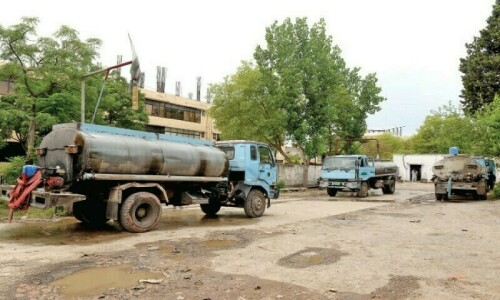THE US inspection of Osama bin Laden’s last abode in Abbottabad has yet again raised the question our policymakers have avoided taking a position on: do criminals and terrorists operate from our soil?
The security establishment is hazy in its approach to the issue of safe havens and sanctuaries. Its ambiguity stems from the way Pakistan’s security establishment has traditionally responded to the issue of safe havens. Consider the following range of official responses over a decade.
Denial: Sanctuaries do not exist in the country. This is propaganda to give us a bad name and then hang us.
Qualified denial: Sanctuaries do not exist in the country. However, we have a porous border and cannot monitor with precision who comes and goes. There are many refugee camps along the border; it is only natural that various groups go back and forth. Smugglers, drug-pushers, kidnappers, etc are organised mafias who have operated through this opportunity zone for decades. If the US-Mexico frontier cannot be managed, asking for perfect Af-Pak border management is to overlook the complexity of the issue.
Give us information mantra: If anyone has information about these sanctuaries, they should pass it to us so we can take action. (This argument has been used frequently for both wanted men and the spaces where they hide. We have said this repeatedly about Osama bin Laden, about Ayman Al Zawahiri and Mullah Omar.)
Counterpunch: International forces, particularly the US, should look at their own system of border monitoring and cross-border infiltration before they ask us to do more. We have more border posts than they have. We have more troops deployed on the border. We have been far more successful than they in fighting organised militancy on our side. Previously, there have been two battles across the border; one by international forces inside Afghanistan, which they have failed to win, the other on our side, which we have won. (In other words, we’re doing alright. Don’t lecture us.)
Counter-complaint: Reverse infiltration is going on. The US hasn’t coordinated its war effort with us, creating a revolving door of militant movement. The hammer and the anvil have not been applied. Resultantly, US operations are driving militants into Pakistani territory.
Countercharge: In some cases, by removing border posts on the Afghan side a deliberate effort has been made to create tactical depth for Afghan-based militants who then recuperate inside Afghanistan with Afghan blessings and come back to scuttle Pakistan’s efforts. In some cases Afghan border forces have facilitated cross-border infiltration, making a lot of money. In some cases they have done it for anti-Pakistan reasons. With so many high-tech resources already deployed, this could not have escaped the notice of the foreign forces there. How come they don’t take action against them? They seem to be encouraging infiltrators, who carve hideouts on our side and move deeper into the urban areas to strike there.
Hydras of history argument: Echoes of the past continue to haunt. Jihadi networks developed over decades are not going to disappear according to a date on the US political calendar. This requires time and patience. We are fighting hydras. Chopping their heads off is not going to pull them out of their holes. The foreigners contracted marriages and have produced a whole generation born and bred here. Children of the jihadis of yore have become, as it were, naturalised citizens. What are called sanctuaries are their homes. While they should leave, and we want them to, the question that nobody answers is where will they go. Why aren’t their governments accepting them?
Poverty proverb: Rich jihadis pay cash to buy hideouts. More aid and development (long-term projects) are needed to address people’s needs so they don’t fall to the temptations held out by rich jihadis from the Gulf.
Supply side problem: Jihadis arrive here from across the world, traversing many countries and regions. This includes western jihadis. How come this supply is not being curbed?
Demand side problem: These jihadis arrive because they see Afghanistan as the real battlefield. The presence of international forces works as a magnet. Prolonged occupation of Afghanistan is a demand puller. As long as there is turmoil there, jihadis are going to come from wherever they can and settle down along the border or inside Afghanistan. The sanctuaries are a consequence and not the cause of the Afghan problem.
Capacity cry: We don’t have the requisite capability to protect the border against infiltration. We need to be properly equipped. As long as technological know-how and the necessary wherewithal is not there it is difficult to fight and discover them. We are overstretched. India continues to assume the posture of a mighty adversary whose military assets are deployed for aggressive Pakistan-specific designs. Our focus is diffused on two borders. For Pakistan to take effective action against those hedged inside the tribal belt, we need Delhi to change its pressure tactics and talk peace. This is a long-term process.
Blowback theory: Taking on these sanctuaries, where the core is hiding, will have a severe blowback; all sleeper cells will become active. While we know that most tracks of terrorism inside Pakistan lead to these sanctuaries, taking on the base terrorists’ operations will open a Pandora’s box which we cannot handle at this point.
Our own people theory: They are our own people. We cannot kill them all. We must work towards reconciliation.
Our own people theory No. 2: They are our own people; if we have to kill the bad eggs among them we will do so, but at our own pace, in our own way.Not our own people, but we need them theory: They are not our own people but influential Afghan fighters who will stay powerful even after the US departs. We can’t pick a fight with them because that is like sticking matchsticks in a hornet’s nest.
To be concluded
The writer is a senior journalist at DawnNews.












































Dear visitor, the comments section is undergoing an overhaul and will return soon.